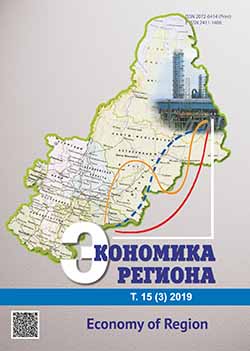ИНСТИТУЦИОНАЛЬНЫЕ ФАКТОРЫ АКТИВИЗАЦИИ ПРИВЛЕЧЕНИЯ ПРЯМЫХ ИНОСТРАННЫХ ИНВЕСТИЦИЙ В ЭКОНОМИКУ РАЗВИВАЮЩИХСЯ СТРАН
Institutional Factors of Enhancing the Attraction of Foreign Direct Investment in the Economies of Developing Countries
Author(s): Igor Mikhailovich Drapkin, Oleg Svyatoslavovich Mariev, Alena Dmitrievna GalenkovaSubject(s): Economy
Published by: Институт экономики Уральского отделения Российской академии наук
Keywords: foreign direct investment; institutional factors; developing countries; economic development; econometric analysis; panel data; index of economic freedom; state insolvency index; threshold value;
Summary/Abstract: Permanent inflow of foreign direct investment is a powerful driver of economic development in developing countries. However, the country’s underdeveloped institutional environment imposes additional costs on the investors. We identified the specificity of the institutional environment’s impact on attracting foreign direct investment (FDI) in developing countries with different levels of economic development. Based on the heterogeneity of the studied countries, we hypothesised that in developing countries institutions become an active determinant of FDI after exceeding a certain threshold. In other words, institutional factors do not affect FDI inflows into relatively underdeveloped countries among a group of developing countries whose level of economic development does not exceed the threshold. To test this hypothesis, we simulated an intra-group economic modelling based on the data of the World Bank, the Heritage Foundation and the For Peace Foundation for the period from 2005 to 2015. The main tool of econometric analysis was a panel regression with fixed effects at the country level and a two-step least squares method with instrumental variables. We used indices of economic freedom and the state insolvency as aggregated indicators of the non-overlapping groups of institutional factors. The study’s main results have confirmed the hypothesis that institutional factors affect FDI inflows only in the countries where gross national income per capita is higher than average. Moreover, we defined the threshold value of gross national income per capita that a country needs to achieve in order to make any institutional changes to enhance FDI inflows. Thus, government policies, aimed at increasing the developing countries’ attractiveness for foreign investors, should firstly take into account the level of economic development of the recipient country.
Journal: Экономика региона
- Issue Year: 15/2019
- Issue No: 3
- Page Range: 952-966
- Page Count: 14
- Language: Russian

